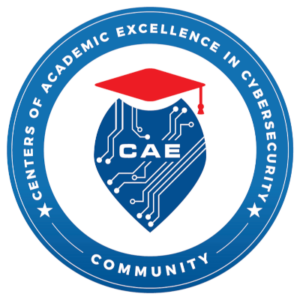Most cyber attacks explore vulnerabilities. It is a common belief that if a system/software was developed with consideration of security risks at each phase of the design process, the system/software will be more robust with less vulnerabilities.
The objective of this emphasis is to educate students with correct computing ethics, prepare them with enough knowledge to understand the importance of cybersecurity, and effectively design robust software and/or computer systems. Graduates who received this emphasis will be excellent candidates for software/ IT security positions or graduate studies in the cybersecurity field.
[Learning Outcomes:] Graduates of this program are expected to be able to:
- Develop software in a variety of languages.
- Understand cyber policies and regulations, and demonstrate proper computing ethics.
- Understand basic cryptographic algorithms and their usages.
- Understand common vulnerabilities and attacks against computer networks and web applications, and their countermeasures.
- Use their written and oral communication skills to contribute to solutions, in individual and collaborative settings.
- Be familiar with network monitoring and web traffic capturing tools.
- Use their computer-science expertise to analyze real-world environments and problems, and to design and implement software-based solutions, in a wide range of application domains.

The Cybersecurity emphasis is validated by the National Security Agency (NSA) and recognized as a National Center of Academic Excellence in Cyber Defense. This five-year designation is awarded by the National Security Agency based upon the university’s proven efforts to reduce threats to national infrastructure by promoting higher education and research in cyber defense and providing the nation with a pipeline of qualified cybersecurity professionals. All graduates of this program will receive an NSA endorsed/validated certificate. You can add this credential to your CV.
[Contact:] Dr. Jyh-haw Yeh for additional details at jhyeh@boisestate.edu or at computerscience@boisestate.edu.
[Degree Program:] Please see the degree requirements for Cybersecurity Emphases in Computer Science.